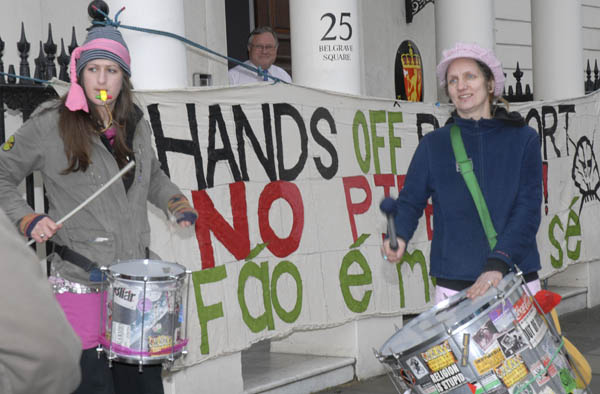 23.03.2007
23.03.2007
Statoil, Norway’s state owned oil company has interests in a gas pipeline being constructed in Ireland. Many locals oppose its construction. Their protests against the pipeline have been policed in a heavy handed way. The protest was taken to the Norwegian embassy in London yesterday.
The non-violent protest outside the Norwegian embassy started at around midday and continued for more than an hour. Police were called but no arrests made. A samba band played and and one policeman complained that the band really needed a string section. It was a good humoured demo, but the point was made. I have personally seen a video of the protests in Ireland and was shocked at the violent way the police delt with often quite elderly protesters who include local fishermen and farmers. I saw them being beaten with battons, pushed and punched.
Press release by demonstrators.
The demonstration held yesterday 22nd March, 2007, by a nationwide autonomous collective, was highlighting Norway’s state-owned Statoild and gas company’s present involvement in the proposed gas pipeline adn refinery development in the West of Ireland at Rossport, county Mayo.
Statoil has an alleged ethical policy, but there are not ethics involved in this development and no local support or consultation. The company, and thus the Norwegian government, are promoting human rights abuses by supporting the Irish State’s policy of brutal suppression of the right to protest using the Irish police (Garda), and polluting Carrowmore Lake, the local drinking water supply.
This group is issuing a demand to Norway and Statoil to stop its part in this development or face a call for a tourist boycott of Norway and disruption of Norwegian trade and commerce to the UK.
================================================
220307_Nor_Emb – video/x-ms-wmv 8.4M
From the press release:
“The demonstration held today, by a nation-wide autonomous collective (and one dog), was highlighting Norway’s state-owned Statoil and gas company’s present involvement in the West of Ireland at Rossport, County Mayo.
Statoil has an alleged “ethical policy”, but there are no ethics involved in this development and no local support or consultation. The company, and thus the Norwegian government, are promoting human rights abuses by supporting the Irish State’s policy of brutal suppression of the right to protest using the Irish police (Garda), and polluting Carrowmore Lake, the local drinking water supply.
This group is issuing a demand to Norway and Statoil to stop its part in this development or face a call for a tourist boycott of Norway and disruption of Norwegian trade and commerce to the UK.”
The dog bit was not in the original release, that was my lil’ add on. So, sue me.
As the video shows the banner blocking the door lasted as long as it took the ten or more heavily armed police officers from the Metropolitan Diplomatic Division to arrive. They removed the banner immediately and ushered the protestors into one specific area of the pavement.
Two Irish citizens then decided to try to apply for a Norwegian passport, as Norway has profited massively from Irish natural resources, producing far superior health and education prospects in Norway than in Ireland. So they figured the least Norway could give back was a free passport and access to their health care.
The representative, as the video shows, seemed to find the whole thing funny at first, but watch his smile drop as he is shown printed images from the recent month’s of violence the local community of Rossport have suffered at the hands of the Garda.
As reported in the 6 November 2006 release of Garda Review, Superintendent Joe Gannon, who is in charge of policing the Shell/Statoil Corrib Gas Terminal construction site, was quoted: “There were no arrests. That was part of our strategy; we did not want to facilitate anyone down there with a route to martyrdom. There has been that policy ever since.”
No arrests. But baton charges, throwing old men and women in ten-foot deep trenches, punching, kicking, martial arts techniques and daily intimidation are acceptable, it seems from this journalist’s own experiences over the last month.
